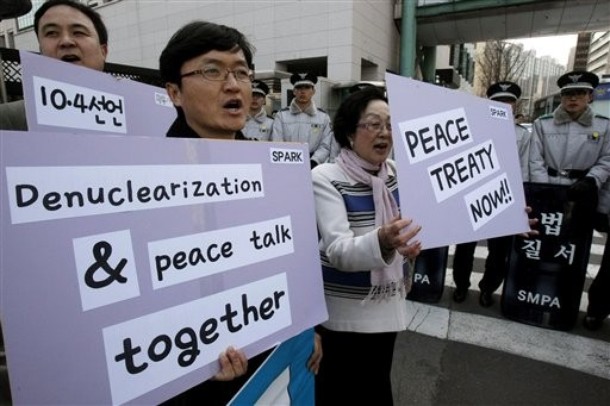The hyperventilation over the nuclear posture review.

Jennifer Rubin has some questions about the Obama administration's nuclear posture review:
What possible rationale would there be for â??revamping American nuclear strategy to substantially narrow the conditions under which the United States would use nuclear weapons, even in self-defenseâ?? Why would we want to announce a new posture that â?eliminates much of the ambiguity that has deliberately existed in American nuclear policy since the opening days of the cold warâ?? [emphasis mine]
I'm going to take a wild guess and say that maybe it's because policy is 50 years old and the Cold War is over?
Rubin also writes:
It seems absurd to be â??explicitly committing not to use nuclear weapons against nonnuclear states that are in compliance with the Nuclear Non-Proliferation Treaty, even if they attacked the United States with biological or chemical weapons or launched a crippling cyberattack.â? All of this only reinforces the perception that Obama is dangerously obsessed with unilateral gestures and disarmament.
I do agree that unilateral American gestures are going to have zero impact on the nuclear designs of Iran and North Korea. That is the idea reportedly animating the administration's push for nuclear disarmament - we'll lead by example - and it's obviously very silly. But since we're never going to live in a world without nuclear weapons - and America will always have a nuclear arsenal sufficient to destroy every imaginable hostile nation we could face - I find much of the huffing and puffing about declaratory policy a bit tendentious.
Stephen Walt has more:
No matter what the U.S. government says about its nuclear strategy, no potential adversary can confidently assume that the U.S. would stick to its declared policy in the event of a crisis or war. If you were a world leader thinking about launching a major conventional attack on an important U.S. ally or interest, or contemplating the use of chemical or biological weapons in a situation where the United States was involved, would you conclude that it was safe to do so simply because Barack Obama said back in 2010 that the U.S. wasn't going to use nuclear weapons in that situation?Of course you wouldn't, because there is absolutely nothing to stop the United States from changing its mind. You'd worry that the United States might conclude that the interests at stake were worth issuing a nuclear threat, and maybe even using a nuclear weapon, and that it really didn't matter what anyone had said in a posture review or an interview with a few journalists. And you'd also have to worry that the situation might escalate in unpredictable or unintended ways -- what Thomas Schelling famously termed the "threat that leaves something to chance -- and thereby ruin your whole day.
(AP Photo)



